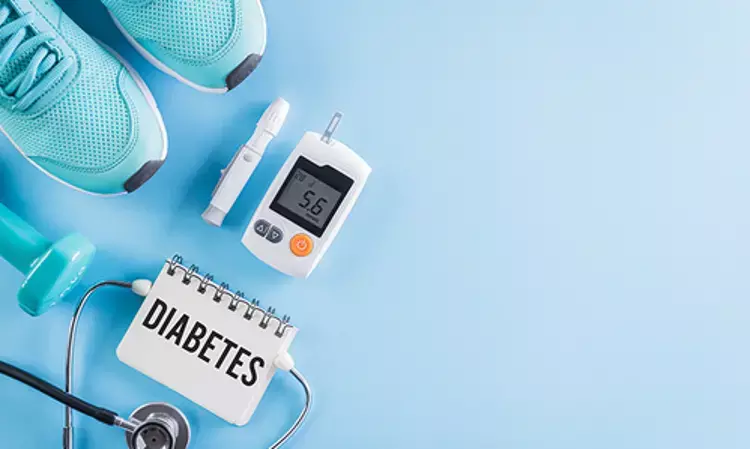- Home
- Medical news & Guidelines
- Anesthesiology
- Cardiology and CTVS
- Critical Care
- Dentistry
- Dermatology
- Diabetes and Endocrinology
- ENT
- Gastroenterology
- Medicine
- Nephrology
- Neurology
- Obstretics-Gynaecology
- Oncology
- Ophthalmology
- Orthopaedics
- Pediatrics-Neonatology
- Psychiatry
- Pulmonology
- Radiology
- Surgery
- Urology
- Laboratory Medicine
- Diet
- Nursing
- Paramedical
- Physiotherapy
- Health news
- Fact Check
- Bone Health Fact Check
- Brain Health Fact Check
- Cancer Related Fact Check
- Child Care Fact Check
- Dental and oral health fact check
- Diabetes and metabolic health fact check
- Diet and Nutrition Fact Check
- Eye and ENT Care Fact Check
- Fitness fact check
- Gut health fact check
- Heart health fact check
- Kidney health fact check
- Medical education fact check
- Men's health fact check
- Respiratory fact check
- Skin and hair care fact check
- Vaccine and Immunization fact check
- Women's health fact check
- AYUSH
- State News
- Andaman and Nicobar Islands
- Andhra Pradesh
- Arunachal Pradesh
- Assam
- Bihar
- Chandigarh
- Chattisgarh
- Dadra and Nagar Haveli
- Daman and Diu
- Delhi
- Goa
- Gujarat
- Haryana
- Himachal Pradesh
- Jammu & Kashmir
- Jharkhand
- Karnataka
- Kerala
- Ladakh
- Lakshadweep
- Madhya Pradesh
- Maharashtra
- Manipur
- Meghalaya
- Mizoram
- Nagaland
- Odisha
- Puducherry
- Punjab
- Rajasthan
- Sikkim
- Tamil Nadu
- Telangana
- Tripura
- Uttar Pradesh
- Uttrakhand
- West Bengal
- Medical Education
- Industry
Handgrip strength could be predictor of diabetes risk in postmenopausal women, finds study

As the average age of the population increases, so does the incidence of diabetes, which is the most expensive chronic disease in the United States. Although it is typically associated with excessive thirst and urination, fatigue, weight loss, and blurred vision, a new study suggests that weak handgrip strength may also be a risk factor. Results of the study are published online today in Menopause, the journal of The Menopause Society.
Diabetes and its related complications are an escalating global public health issue, ranking as the ninth-leading cause of mortality worldwide. Approximately 1 in 11 adults are affected by diabetes. That ratio changes over time as the prevalence of diabetes increases with age, with nearly one in three people aged older than 65 years having diabetes. That makes postmenopausal women at greater risk of having diabetes.
Because of the rising incidence of diabetes, the seriousness of the disease, and the significant financial implications of treating it, there has been a lot of research focused on identifying the various causes and symptoms that may facilitate early diagnosis. It is already known that declining estrogen levels during the menopause transition contribute to a wide array of adverse health problems, including issues with insulin resistance and a reduction in lean mass that is correlated with muscle strength and power.
Because handgrip strength is a recognized measure of muscle strength and an indicator of sarcopenia, a number of researchers have surmised that handgrip strength could be used to help predict diabetes and prediabetes. Results from previous studies attempting to identify a link have been mixed, but research specific to postmenopausal women has been limited.
A new study based on information gathered from more than 4,000 postmenopausal women aged 45 to 65 years suggests that a weaker handgrip strength is associated with a greater likelihood of having diabetes. The inverse relationship between handgrip strength and diabetes prevalence was more pronounced in women who had been postmenopausal for more than 10 years. Additional research is recommended to better understand the association between handgrip strength and diabetes in postmenopausal women.
Survey results are published in the article “Handgrip strength and diabetes in postmenopausal women: insights from the Korean National Health and Nutrition Examination Survey 2014-2019.”
“The results of this study showed that postmenopausal women with high muscle strength were less likely to have diabetes, highlighting the known benefits of maintaining muscle mass-a critical marker for prediction of health status,” says Dr. Stephanie Faubion, medical director for The Menopause Society.
Reference:
Chung, Yun Soo MD1; Baek, Jin Kyung MD, MSCP1; Tran, Thi Minh Chau MD2; Kim, Hae-Rim MSc3; In Jung, Hye MD1; Lee, Jae Kyung MD, MSCP1; Choi, Eun A. MD, MSCP1; Kim, Hee Yon MD, PhD1; Yun, Bo Hyon MD, PhD1; Seo, Seok Kyo MD, PhD1. Handgrip strength and diabetes in postmenopausal women: insights from the Korean National Health and Nutrition Examination Survey 2014-2019. Menopause ():10.1097/GME.0000000000002453, December 3, 2024. | DOI: 10.1097/GME.0000000000002453
Dr Kamal Kant Kohli-MBBS, DTCD- a chest specialist with more than 30 years of practice and a flair for writing clinical articles, Dr Kamal Kant Kohli joined Medical Dialogues as a Chief Editor of Medical News. Besides writing articles, as an editor, he proofreads and verifies all the medical content published on Medical Dialogues including those coming from journals, studies,medical conferences,guidelines etc. Email: drkohli@medicaldialogues.in. Contact no. 011-43720751


